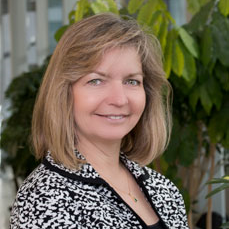
Brigham and Women’s Hospital’s Division of Endocrinology, Diabetes and Hypertension cares for patients with a wide range of hormonal and other related disorders, including diabetes, hypertension and thyroid disease. Division Chief Ursula B. Kaiser, MD, recently discussed some of her group’s accomplishments and how the COVID-19 pandemic has affected physicians and other health care providers in the division.
In addition to her leadership role at the Brigham, Dr. Kaiser serves on the National Institutes of Health (NIH)/National Institute of Child Health and Human Development Board of Scientific Counselors, as deputy editor-in-chief of The Journal of Clinical Endocrinology and Metabolism and as director of the Brigham Research Institute.
Facing the Challenges of COVID-19
Although endocrinology is not the specialty that most people think of first with regard to treating COVID-19, members of the division have helped care for those who were hospitalized.
“Many patients with severe cases of COVID-19 have underlying endocrine and metabolic disorders, and those can be profoundly exacerbated by the disease,” Dr. Kaiser explained. “Many critically ill patients with COVID-19 and underlying diabetes became profoundly hyperglycemic with severe insulin resistance, and we had to come up with completely new treatment protocols for them.”
Division members also helped lead the way in addressing the challenges of the pandemic to the broader endocrinology community. These included Marie E. McDonnell, MD, who co-authored several publications providing guidance for management of patients with diabetes mellitus and COVID-19. Brigham endocrine faculty and fellows also stepped in to help care for patients with COVID-19 when extra providers were needed.
Dr. Kaiser noted that the pandemic has substantially changed care delivery through an expanded use of telemedicine. “I was very proud of how quickly our endocrine faculty adapted,” she said. “Endocrinology is a field that’s well-suited to virtual care.”
She expects virtual care will continue to have an important role going forward because it offers many advantages to patients with chronic health conditions who need to be seen often. In addition to reducing the risk of exposure to the virus that causes COVID-19, telemedicine lessens the need for patients to take time off from work. This can translate to fewer missed or canceled appointments and hence improved, more regular and more frequent care.
Collaborative Programs to Address Obesity
Much progress has been made in supporting patients who struggle with weight management, weight control and obesity, Dr. Kaiser said. Within the Brigham’s Center for Weight Management and Wellness, division members work closely with Brigham bariatric surgeons, gastroenterologists and experts in other areas to provide comprehensive care for these patients.
“The Brigham has recognized that weight control is a major challenge for many people,” Dr. Kaiser said. “This is especially true for disadvantaged patients and underserved minority groups.” Many studies have shown higher rates of obesity in Black and Latinx populations compared with whites, she noted. One reason for this is socioeconomic status, which can impact access to fresh, healthy foods such as fruits and vegetables.
New efforts in weight management and wellness are being instituted not only at the main hospital, but also in critical satellite locations throughout the Boston area. “We’re going where there is the greatest need for these services, due to a higher number of people in these populations struggling with obesity,” Dr. Kaiser said.
A Focus on Interdisciplinary Initiatives
Dr. Kaiser, who recently received the Endocrine Society’s 2021 Sidney H. Ingbar Award for Distinguished Service and has been named president-elect of the society for 2021, highlighted several other interdisciplinary programs that she is excited about. These include new efforts in thyroid care, particularly for people with thyroid nodules and thyroid cancer.
Furthermore, division members are collaborating with colleagues in radiology and oncology to conduct laboratory research and to achieve new advances in diagnosis and clinical care. For example, thyroid specialists at the Brigham have been at the forefront of using gene-expression classifiers for preoperative risk assessment. They also have a multidisciplinary clinic, in which radiologists aid in preoperative diagnosis and surgeons aid in perioperative care and management.
Adrenal disorders is another area where the division continues to play a leading role. “Our Center for Adrenal Disorders brings in patients not only from around the United States, but international patients as well,” Dr. Kaiser said. This partnership among the Brigham, Boston Children’s Hospital and Dana-Farber Cancer Institute (DFCI) is focused on patient care along with basic and translational research.
Accolades for Division Members
Dr. Kaiser noted a number of honors and awards received in the past year by members of the Division of Endocrinology, Diabetes and Hypertension, including:
- Erik K. Alexander, MD, was appointed as the inaugural Brigham Health vice president of education.
- Mehmet Furkan Burak, MD, was the recipient of the 2020 Endocrine Society Early Investigator Award.
- Ole-Peter R. Hamnvik, MBBCH, received the Gail Backus Endocrinology Faculty Clinical Teaching Award and the Ambulatory Lecturing Attending Award.
- Sylvia Kehlenbrink Oh, MD, was named chair of the International Alliance for Diabetes Action and was the invited Plenary Speaker at the IDF Congress 2019.
- Meryl Susan LeBoff, MD, was awarded the 2020 American Association of Clinical Endocrinologists: ACE Distinction in Endocrinology Award in recognition of advancing the understanding of endocrinology through research and education.
A number of research grants also were awarded to division faculty, including a Dubai Harvard Foundation for Medical Research Fellowship, an NIH Specialized Center of Research Excellence (SCORE) in Women’s Health grant and an NIH Building Interdisciplinary Research Careers in Women’s Health K12 award.